How to create a financial forecast for a real estate agency?
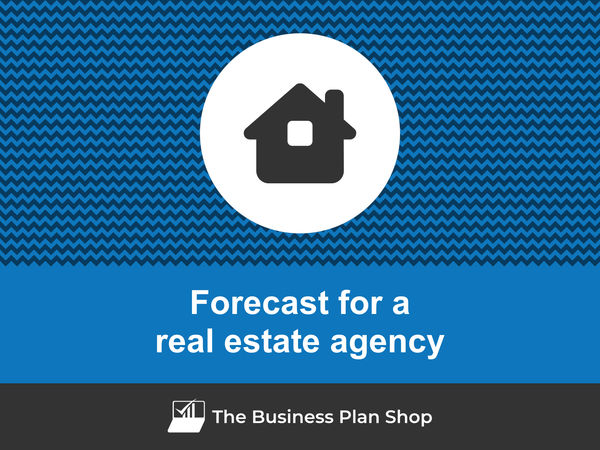
If you are serious about keeping visibility on your future cash flows, then you need to build and maintain a financial forecast for your real estate agency.
Putting together a real estate agency financial forecast may sound complex, but don’t worry, with the right tool, it’s easier than it looks, and The Business Plan Shop is here to guide you.
In this practical guide, we'll cover everything you need to know about building financial projections for your real estate agency.
We will start by looking at why they are key, what information is needed, what a forecast looks like once completed, and what solutions you can use to create yours.
Let's dive in!
Why create and maintain a financial forecast for a real estate agency?
The financial projections for your real estate agency act as a financial blueprint to guide its growth with confidence and ensure its long-term financial viability.
To create them, you will need to look at your business in detail - from sales to operating costs and investments - to assess how much profit it can generate in the years to come and what will be the associated cash flows.
During challenging market conditions, maintaining an up-to-date financial forecast enables early detection of potential financial shortfalls, allowing for timely adjustments or securing financing before facing a cash crisis.
Your real estate agency's financial forecast will also prove invaluable when seeking financing. Banks and investors will undoubtedly request a thorough examination of your financial figures, making precision and presentation essential.
Need a convincing business plan?
The Business Plan Shop makes it easy to create a financial forecast to assess the potential profitability of your projects, and write a business plan that’ll wow investors.

What information is used as input to build a real estate agency financial forecast?
A real estate agency's financial forecast needs to be built on the right foundation: your assumptions.
The data required to create your assumptions will depend on whether you are a new or existing real estate agency.
If you are creating (or updating) the forecast of an existing real estate agency, then your main inputs will be historical accounting data and operating metrics, and your team’s view on what to expect for the next three to five years.
If you are building financial projections for a new real estate agency startup, you will need to rely on market research to form your go-to-market strategy and derive your sales forecast.
For a new venture, you will also need an itemised list of resources needed for the real estate agency to operate, along with a list of equipment required to launch the venture (more on that below).
Now that you understand what is needed, let’s have a look at what elements will make up your real estate agency's financial forecast.
The sales forecast for a real estate agency
The sales forecast, also called topline projection, is normally where you will start when building your real estate agency financial forecast.
Creating a coherent sales projection boils down to estimating two key drivers:
- The average price
- The number of monthly transactions
To do this, you will need to rely on historical data (for an existing business), market research data (for both new and existing real estate agencies), and consider the elements below:
- Economic conditions: Changes in the overall economy can greatly impact the real estate market. For example, if there is a recession, people may be less likely to buy or sell homes, leading to a decrease in average prices and number of transactions.
- Interest rates: Fluctuations in interest rates can affect the affordability of homes for potential buyers. If interest rates rise, it may deter some buyers from making a purchase, leading to a decrease in the number of transactions and potentially a decrease in average prices.
- Demographic shifts: Changes in the population, such as an increase in the number of young adults or retirees, can impact the real estate market. For example, an influx of young adults may lead to an increase in demand for rental properties, while a larger retiree population may lead to an increase in demand for retirement communities, both of which can affect average prices and number of transactions.
- Competition: The number and strength of competitors in the local market can also influence the business's performance. If there is an increase in the number of real estate agencies or if a new agency with a strong reputation enters the market, it may lead to a decrease in the business's market share, resulting in a decrease in average prices and number of transactions.
- Government policies: Changes in government policies, such as tax laws or zoning regulations, can have a significant impact on the real estate market. For instance, if the government introduces new tax incentives for first-time homebuyers, it may lead to an increase in demand for homes and potentially an increase in average prices.
After the sales forecast comes the operating expenses budget, which we will now look into in more detail.
Need a convincing business plan?
The Business Plan Shop makes it easy to create a financial forecast to assess the potential profitability of your projects, and write a business plan that’ll wow investors.

The operating expenses for a real estate agency
The next step is to estimate the costs you’ll have to incur to operate your real estate agency.
These will vary based on where your business is located, and its overall size (level of sales, personnel, etc.).
But your real estate agency's operating expenses should normally include the following items:
- Staff costs: Including salaries, benefits, and training for your agents, administrative staff, and property managers.
- Accountancy fees: For handling your financial records, taxes, and audits.
- Insurance costs: For protecting your agency and properties against risks such as liability, property damage, and errors and omissions.
- Software licenses: For using real estate-specific software to manage listings, contracts, and client information.
- Banking fees: For maintaining bank accounts, processing payments, and transferring funds.
- Marketing and advertising: Including online and offline advertising, signage, and promotional materials.
- Office rent and utilities: For leasing office space and paying for electricity, water, and internet access.
- Professional development: For attending conferences, workshops, and training programs to improve your skills and knowledge.
- Office supplies: Including stationery, printer ink, and other necessary items for day-to-day operations.
- Property maintenance: For keeping your properties in good condition, including repairs, landscaping, and cleaning.
- Legal fees: For consulting with lawyers on contracts, disputes, and other legal matters.
- Membership dues: For joining professional organizations and networking groups in the real estate industry.
- Travel expenses: Including transportation, lodging, and meals for business trips and property showings.
- Office equipment: For purchasing and maintaining computers, printers, and other necessary equipment.
- Phone and internet: For communication with clients, agents, and other parties involved in real estate transactions.
This list is not exhaustive by any means, and will need to be tailored to your real estate agency's specific circumstances.
What investments are needed to start or grow a real estate agency?
Creating and expanding a real estate agency also requires investments which you need to factor into your financial forecast.
Capital expenditures and initial working capital items for a real estate agency could include elements such as:
- Office Space: This includes the cost of renting or purchasing office space for your real estate agency. It may also include renovation or remodeling costs to make the space suitable for your business needs.
- Furniture and Equipment: This encompasses the purchase of desks, chairs, computers, printers, and other necessary equipment for your office. These items are considered fixed assets as they are used for a long period of time and are essential for the daily operations of your agency.
- Vehicles: If your real estate agency requires agents to travel to properties or meet with clients, you may need to purchase vehicles. These can include company cars or reimbursements for agents who use their personal vehicles for work purposes.
- Technology and Software: In today's digital age, technology and software are crucial for real estate agencies. This may include purchasing a customer relationship management (CRM) system, website development, and other software tools to help manage your business and communicate with clients.
- Security Systems: As a real estate agency, you may have valuable assets such as client information and properties in your possession. Investing in security systems, such as surveillance cameras and alarms, can help protect your business and assets.
Again, this list is not exhaustive and will need to be adjusted according to the circumstances of your real estate agency.
Need a convincing business plan?
The Business Plan Shop makes it easy to create a financial forecast to assess the potential profitability of your projects, and write a business plan that’ll wow investors.

The financing plan of your real estate agency
The next step in the creation of your financial forecast for your real estate agency is to think about how you might finance your business.
You will have to assess how much capital will come from shareholders (equity) and how much can be secured through banks.
Bank loans will have to be modelled so that you can separate the interest expenses from the repayments of principal, and include all this data in your forecast.
Issuing share capital and obtaining a bank loan are two of the most common ways that entrepreneurs finance their businesses.
What tables compose the financial plan for a real estate agency?
Now let's have a look at the main output tables of your real estate agency's financial forecast.
The profit & loss forecast
The forecasted profit & loss statement will enable you to visualise your real estate agency's expected growth and profitability over the next three to five years.
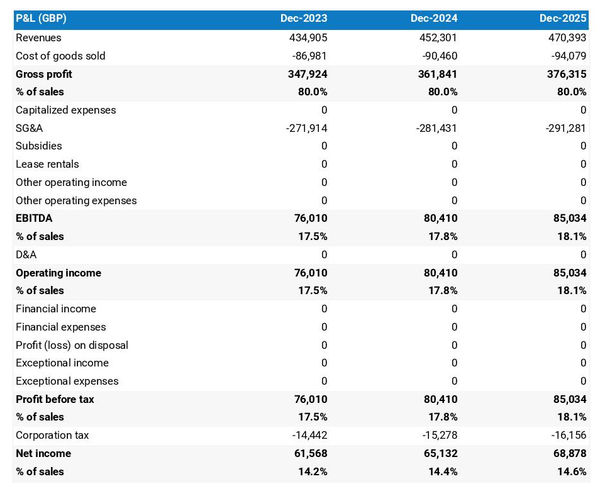
A financially viable P&L statement for a real estate agency should normally show:
- Sales growing above inflation
- Stable or expanding (ideally) profit margins
- A net profit
This will of course depend on the stage of your business: a new venture might be loss-making until it reaches its breakeven point in year 2 or 3, for example.
The projected balance sheet
Your real estate agency's projected balance sheet provides a snapshot of your business’s financial position at year-end.
It is composed of three types of elements: assets, liabilities and equity:
- Assets: represent what the business possesses including cash, equipment, and accounts receivable (money owed by clients).
- Liabilities: represent funds advanced to the business by lenders and other creditors. They include accounts payable (money owed to suppliers), taxes payable and loans from banks and financial institutions.
- Equity: is the combination of what has been invested by the business owners and the cumulative profits and losses generated by the business to date (which are called retained earnings). Equity is a proxy for the value of the owner's stake in the business.
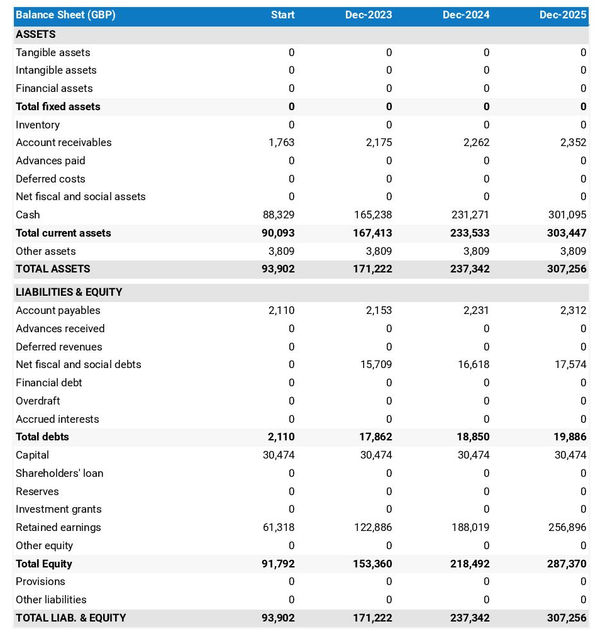
The projected cash flow statement
A projected cash flow statement for a real estate agency is used to show how much cash the business is generating or consuming.
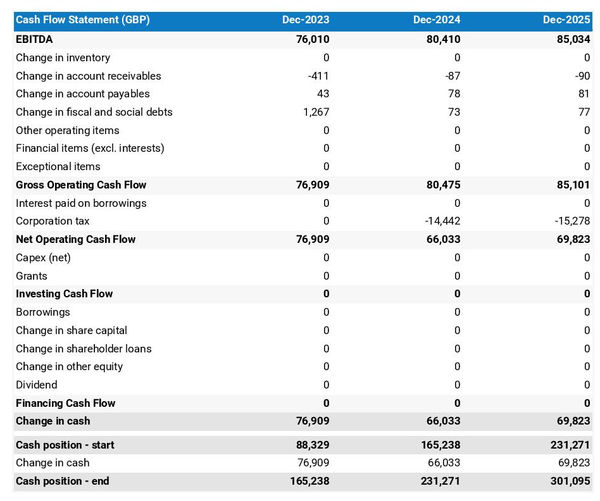
The cash flow forecast is usually organised by nature to show three key metrics:
- The operating cash flow: do the core business activities generate or consume cash?
- The investing cash flow: how much is the business investing in long-term assets (this is usually compared to the level of fixed assets on the balance sheet to assess whether the business is regularly maintaining and renewing its equipment)?
- The financing cash flow: is the business raising new financing or repaying financiers (debt repayment, dividends)?
Cash is king and keeping an eye on future cash flows is imperative for running a successful business. Therefore, you should pay close attention to your real estate agency's cash flow forecast.
If you are trying to secure financing, note that it is customary to provide both yearly and monthly cash flow forecasts in a financial plan - so that the reader can analyze seasonal variation and ensure the real estate agency is appropriately capitalised.
Need a convincing business plan?
The Business Plan Shop makes it easy to create a financial forecast to assess the potential profitability of your projects, and write a business plan that’ll wow investors.

Which tool should you use to create your real estate agency's financial forecast?
Creating your real estate agency's financial forecast may sound fairly daunting, but the good news is that there are several ways to go about it.
Using online financial projection software to build your real estate agency's forecast
The modern and easiest way to build a forecast is to use professional financial projection software such as the one we offer at The Business Plan Shop.
There are several advantages to using specialised software:
- You can easily create your financial forecast by letting the software take care of the financial calculations for you without errors
- You have access to complete financial forecast templates
- You get a complete financial forecast ready to be sent to your bank or investors
- You can easily track your actual financial performance against your financial forecast, and recalibrate your forecast as the year goes by
- You can create scenarios to stress test your forecast's main assumptions
- You can easily update your forecast as time goes by to maintain visibility on future cash flows
- You have a friendly support team on standby to assist you when you are stuck
- It’s cost-efficient and much cheaper than using an accountant or consultant (see below)
If you are interested in this type of solution, you can try our forecasting software for free by signing up here.
Hiring a financial consultant or chartered accountant
Hiring a consultant or chartered accountant is also an efficient way to get a professional real estate agency financial projection.
As you can imagine, this solution is much more expensive than using software. From experience, the creation of a simple financial forecast over three years (including a balance sheet, income statement, and cash flow statement) is likely to start around £700 or $1,000 excluding taxes.
The indicative estimate above, is for a small business, and a forecast done as a one-off. Using a financial consultant or accountant to track your actuals vs. forecast and to keep your financial forecast up to date on a monthly or quarterly basis will naturally cost a lot more.
If you choose this solution, make sure your service provider has first-hand experience in your industry, so that they may challenge your assumptions and offer insights (as opposed to just taking your figures at face value to create the forecast’s financial statements).
Why not use a spreadsheet such as Excel or Google Sheets to build your real estate agency's financial forecast?
You and your financial partners need numbers you can trust. Unless you have studied finance or accounting, creating a trustworthy and error-free real estate agency financial forecast on a spreadsheet is likely to prove challenging.
Financial modelling is very technical by nature and requires a solid grasp of accounting principles to be done without errors. This means that using spreadsheet software like Excel or Google Sheets to create accurate financial forecasts is out of reach for most business owners.
Creating forecasts in Excel is also inefficient nowadays:
- Software has advanced to the point where forecasting can be done much faster and more accurately than manually on a spreadsheet.
- With artificial intelligence, the software is capable of detecting mistakes and helping decision-making.
Spreadsheets are versatile tools but they are not tailor-made for reporting. Importing your real estate agency's accounting data in Excel to track actual vs. forecast is incredibly manual and tedious (and so is keeping forecasts up to date). It is much faster to use dedicated financial planning tools like The Business Plan Shop which are built specially for this.
Need a convincing business plan?
The Business Plan Shop makes it easy to create a financial forecast to assess the potential profitability of your projects, and write a business plan that’ll wow investors.

Use our financial projection templates for inspiration
The Business Plan Shop has dozens of financial forecast templates available.
Our examples contain a complete business plan with a financial forecast and a written presentation of the company, the team, the strategy, and the medium-term objectives.
Whether you are just starting out or already have your own real estate agency, looking at our financial forecast template is a good way to:
- Understand what a complete business plan should look like
- Understand how you should model financial items for your real estate agency
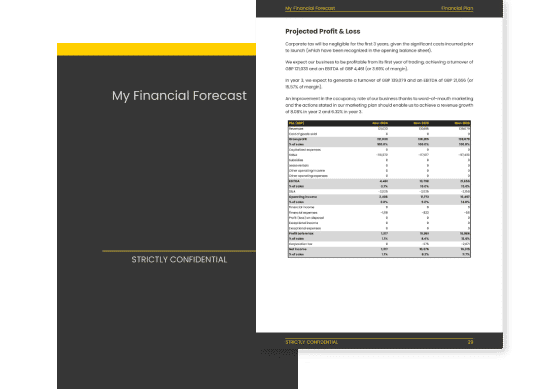
Takeaways
- Having a financial forecast enables you to visualise the expected growth, profitability, and cash generation for your business over the next three to five years.
- Tracking actuals vs. forecast and keeping your financial projections up-to-date is the only way to get a view on what your real estate agency future cash flows may look like.
- Using financial forecasting software is the mordern and easy way to create and maintain your forecasts.
This is the end of our guide on how to build the financial forecast for a real estate agency, we hope you found it useful. Don't hesitate to contact us if you want to share your feedback or have any questions.
Need a convincing business plan?
The Business Plan Shop makes it easy to create a financial forecast to assess the potential profitability of your projects, and write a business plan that’ll wow investors.

Also on The Business Plan Shop
- Example of financial forecast
- How to create a turnover forecast for a business?
- Financial forecast for a business idea
Know someone who owns or is thinking of starting a real estate agency? Share our forecasting guide with them!




